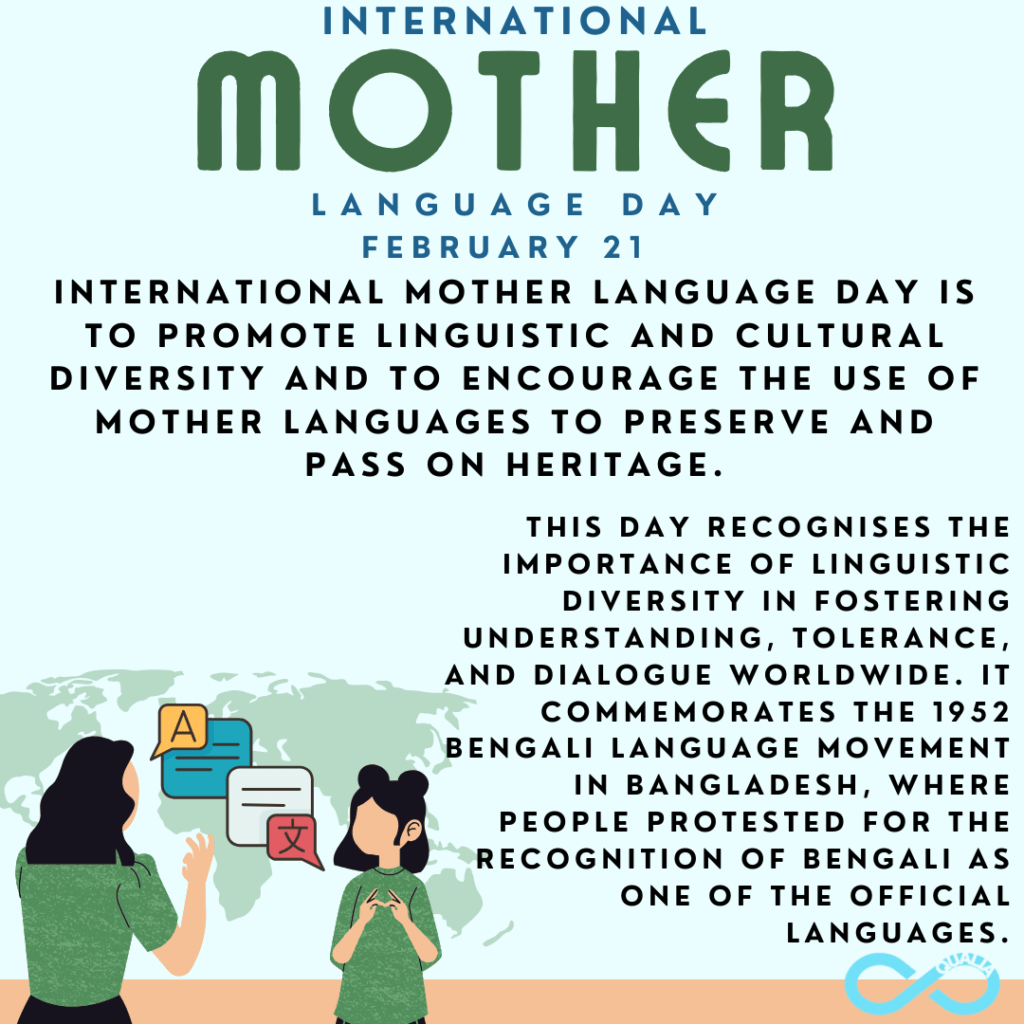International Mother Language Day is observed on February 21st each year. The day emphasises the significance of preserving and celebrating mother languages to promote cultural heritage and communication.

The mother language is significant for several reasons:
1. Cultural Identity: It plays a fundamental role in shaping an individual’s cultural identity, connecting them to their heritage, traditions, and familial roots.
2. Communication: Proficiency in one’s mother language is often the most effective and nuanced way to communicate thoughts, emotions, and ideas.
3. Cognitive Development: Early exposure to the mother language contributes to cognitive development, including language skills, memory, and problem-solving abilities.
4. Social Connection: It fosters social connections within communities that share the same language, promoting a sense of belonging and understanding.
5. Preservation of Heritage: The mother language carries cultural nuances, oral traditions, and historical perspectives, contributing to the preservation of a community’s heritage.
6. Educational Foundation: A strong foundation in the mother language enhances learning abilities, serving as a basis for acquiring additional languages and skills.
7. Emotional Expression: Individuals often feel most comfortable expressing their emotions and experiences in their mother language, fostering a deeper emotional connection.
Celebrating and preserving mother languages is essential for promoting linguistic diversity, understanding, and cultural richness globally.
here are five languages, in addition to English, that are commonly spoken in the UK:
Polish: Poland has been a significant source of migration to the UK, leading to a substantial Polish-speaking community. Polish is one of the most commonly spoken languages after English.
Punjabi: Punjabi is spoken by communities with roots in both India and Pakistan. It is one of the languages with a significant presence in the UK, reflecting the diversity of the South Asian diaspora.
Arabic:Arabic is spoken by communities from various Arab countries, including those from the Middle East and North Africa.
French: French is spoken by communities with French backgrounds and is also commonly taught in schools. French expatriates and individuals from francophone countries contribute to its presence in the UK.
Here are some Top Phrases used in these languages
Polish:
- Cześć, jak się masz? (Hello, how are you?)
- Dziękuję bardzo. (Thank you very much.)
- Jak masz na imię? (What’s your name?)
- Przepraszam. (Excuse me/I’m sorry.)
- Kocham cię. (I love you.)
Punjabi:
- ਸਤ ਸੀ੍ ਅਕਾਲ (Sat Sri Akaal): A traditional Punjabi greeting, equivalent to “Hello” or “Greetings.” It is often used to wish someone well.
- ਕਿਵੇਂ ਹੋ? (Kiven ho?): How are you? This phrase is used to inquire about someone’s well-being.
- ਧੰਨਵਾਦ (Dhannvaad): Thank you. This is a common expression of gratitude.
- ਤੁਹਾਨੂੰ ਨਾਂ ਕੀ ਹੈ? (Tuhano naam ki hai?): What is your name? A polite way to ask someone for their name.
- ਮੈਨੂੰ ਮਾਫ਼ ਕਰੋ (Mainu maaf karo): Excuse me/I’m sorry. Used to apologize or get someone’s attention politely.
Arabic:
- مرحبًا، كيف حالك؟ (Marḥabā, kayfa ḥālak?) Hello, how are you? Used as a common greeting to inquire about someone’s well-being.
- شكرًا جزيلاً (Shukran jazilan) Thank you very much. Used when expressing gratitude in a polite and appreciative manner.
- ما اسمك؟ (Mā ismuka?) What’s your name? (when addressing a male) used when asking someone about their name in a polite way.
- عذرًا (‘Aaḏrān) Excuse me/I’m sorry. used for apologizing or seeking attention politely.
- أنا أحبك (Ana uḥibbuka) I love you. (when addressing a male) used for Expressing love or affection.
French:
- Bonjour, comment ça va ? (Hello, how are you?) A standard greeting to inquire about someone’s well-being.
- Merci beaucoup. (Thank you very much.) Usage: Expressing gratitude in a polite and appreciative manner.
- Comment t’appelles-tu ? (What’s your name?) Usage: Asking someone about their name in a friendly manner.
- Excusez-moi. (Excuse me/I’m sorry.) Usage: Apologizing or seeking attention politely.
- Je t’aime. (I love you.) Usage: Expressing love or affection
People may face various struggles when using their mother language, including:
1. Language Barriers: In multilingual environments, individuals might encounter language barriers that hinder effective communication, both in personal and professional contexts.
2. Limited Resources: Speakers of less widely spoken languages may face challenges in accessing educational materials, literature, and online resources in their mother language.
3. Stigmatisation: Some individuals may experience stigma or discrimination due to the perception of their mother language as less prestigious, hindering self-expression and confidence.
4. Lack of Recognition: Certain languages may not receive official recognition, leading to issues in education, government services, and legal matters, limiting opportunities for speakers.
5. Globalisation Impact: The dominance of major languages in global business and media can marginalise less spoken languages, impacting economic opportunities and cultural representation.
6. Preservation: Communities may struggle to preserve their mother language, especially if it is endangered, leading to a loss of cultural heritage and identity.
7. Educational Challenges: In regions where educational resources are scarce, students may face difficulties in learning and acquiring proficiency in their mother language.
Addressing these challenges involves promoting linguistic diversity, supporting language preservation efforts, and ensuring equal access to educational and economic opportunities for speakers of all languages.
To support and address challenges related to mother languages, consider the following actions:
1. Promote Linguistic Diversity: Advocate for the importance of linguistic diversity in education, culture, and society to raise awareness about the value of all languages.
2. Support Language Education: Invest in language education programs that teach both widely spoken and minority languages, fostering proficiency and cultural understanding.
3. Preservation Efforts: Contribute to initiatives aimed at preserving endangered languages through documentation, community engagement, and educational programs.
4. Cultural Exchange: Encourage cultural exchange programs that celebrate and share diverse languages, fostering mutual respect and understanding.
5. Accessible Resources: Work towards providing accessible educational materials, online content, and literature in various languages, especially those with limited resources.
6. Inclusive Policies: Advocate for inclusive language policies in education, government, and public services, ensuring that all languages receive fair treatment and recognition.
7. Community Empowerment: Empower linguistic communities to take ownership of their language preservation efforts, involving them in decision-making processes.
8. Global Collaboration: Support international collaborations and organisations working towards linguistic diversity, sharing best practices and resources.
By taking these steps, individuals, communities, and organisations can contribute to the preservation, promotion, and appreciation of mother languages, fostering a more inclusive and culturally rich global environment.









